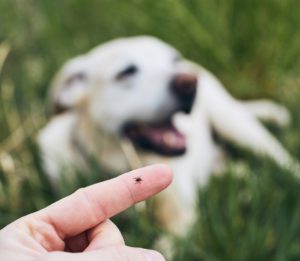The Truth About Ticks in St. Paul, MN

These diseases can have long-lasting and lifelong effects on our dog’s health. They can affect us, too. Many of the tickborne diseases cause similar clinical signs in our dogs, including but not limited to fever, vomiting, lethargy, joint pain, lameness, decreased appetite, and bruising. Depending on the disease, testing to diagnose which tickborne disease your dog has can be rigorous and treatment can range from long courses of antibiotics to blood transfusions and other more advanced treatments.
To protect your dogs from tickborne diseases it is recommended to keep them on a flea and tick preventative all year round. There are a variety of preventives out there, including topical treatments which are applied to the skin, collars, and chewable formulations. Depending on the formulation they can be required to be dosed monthly, every 3 months or every 8 months. We recommend that generally if you get any tick preventative you get it from a reputable, veterinary verified source, as over the counter options can contain ingredients which cause our dogs to become ill.
If you notice that your dog has a tick attached you should use a tick tornado or another such tool to remove the tick entirely, ensuring that the head is removed completely. It is important to remove the head completely as a detached, embedded head can still transmit disease. We recommend checking your dog carefully after every walk/hike to look for ticks and remove them manually as soon as possible.
If you notice that your dog has been bitten by an engorged tick or you would like to pick up a preventative, please call St Paul Pet Hospital at 651-789-6275 so that we can discuss next steps.

